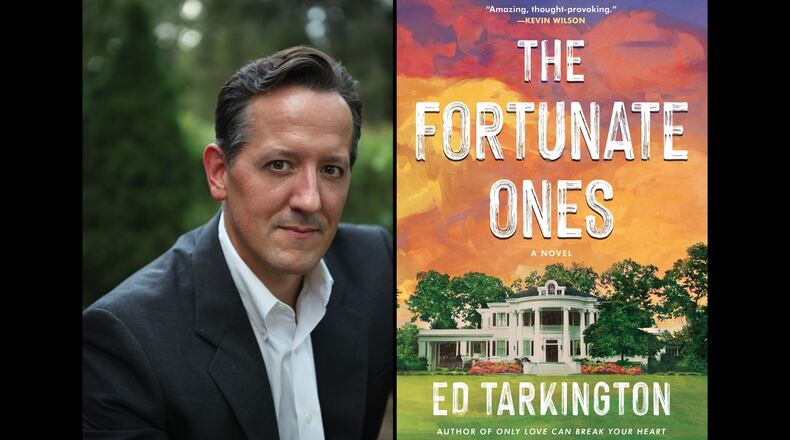Setting the bar high for his novel of money, politics and memory, Ed Tarkington’s preface to “The Fortunate Ones” comes from “All the King’s Men,” Robert Penn Warren’s classic about deception, sacrifices and misplaced honor in 1930s Louisiana.
Charlie Boykin is born out of wedlock in 1969 to Bonnie, an unlucky 15-year-old South Carolina girl from an upper-middle-class family. She’s tossed out and forced to shelter in Nashville with a cousin. Raised in a scrabbly apartment complex in the rough part of town, his life is forever changed when he is offered a scholarship to Yeatman, an elite Nashville private school that is well beyond the reach of his cocktail waitress mother.
Vastly impressed by Yeatman’s “stately and noble” surroundings during an initial visit, Charlie is likewise taken by the change the experience brings out in his mother. Like Cinderella transported from the ashen fireplace, she’s suddenly returned to wholesomeness. Her hair smoothed and attired in a tasteful dress and flats, she’s miles away from the short-skirted, big-haired barroom look she’d adopted to earn a living. It would be the turning point of his life, Charlie recalls: “If not for that day, I never would have left East Nashville for Belle Meade, nor would I have understood how much the conditions of life in one world depend on the whims of those who live in another.”
Through Yeatman Charlie is introduced to the triumvirate that will shape his next 20 years: Archer “Arch” Creigh and twins Jamie and Vanessa Haltom, teens whose fathers had been best friends at Vanderbilt. They practically grew up together after the death of Arch’s father to brain cancer at a young age. While he will always be an outsider given his economic status, Charlie’s inclusion in the group nevertheless entitles him to many of the perks and expectations the three have grown up with. It’s a golden time full of possibilities and yearning — and he quickly adapts, especially after his mother is offered a job and they move into the Haltom’s guest house.
Rakish, easy-in-his-skin Arch is appointed Charlie’s “big brother” at Yeatman, in the process becoming the sun to Charlie’s revolving planet. While not in the same grade at school, they are soon inseparable, and Charlie goes from wide-eyed observer to Arch’s best friend, learning family secrets and riding shotgun on visits to the sacred hunting lodge built by Arch’s father and the twins’ dad Jim. Blonde, leggy Vanessa becomes the object of his desire, but it’s complicated by his attraction to Arch.
Charlie’s awestruck reflections during this initial courting are cinematic in their descriptions: Tarkington’s prose glows like the sun hitting the chlorine-scented pool chairs lining the lush backyards. Mothers who don’t work, video games in the pool house, ordering burgers from “the club” — Charlie is quickly enthralled.
But what is Arch really extending with his invitations to Charlie, and who exactly is he? As a friend he offers entry into Nashville’s elite society, status at Yeatman, sometimes even employment. But as a character we never learn his motivations beyond his wanting to succeed for the sake of his father and his family’s reputation. Siblings are mentioned (we learn Arch is the youngest and has older sisters) but aren’t a part of his daily life. Believing his homosexuality to be well concealed, Arch marries Vanessa, begins a career in finance and later decides to enter politics.
After Yeatman, Charlie runs away to Mexico when a scandal involving his mother comes to light. Ten years pass before he reenters Nashville life, the onetime hanger-on turned professional artist. Coming home to see his seriously ill mother, he’s drawn back to Arch, who’s campaigning for mayor. As Charlie becomes an in-demand portraitist to the wives and children of the gentry, his observations of the Belle Meade residents become more cynical. His adoration no longer obscures the truth.
Watching the political gamesmanship and manipulation Arch and his “team” employ to win votes, Charlie finally sees through the glowing facade. He’s appalled when Arch co-opts Charlie’s relationship with Terrance, his closest friend growing up in the apartment complex, now a preacher for an influential black church. Despite his qualms, Charlie accepts a job offer from Arch several years later when the senate beckons, mainly to stay close to Vanessa.
Charlie is repeatedly lied to, tricked and left out of the loop by his family and friends. His reaction to these offenses is to escape to the beautiful, artsy town of San Miguel de Allende in Guanajuato, Mexico, and later to join the military, where he is sent on casualty notifications because of his sympathetic countenance. Always the outsider, the role suits him.
Tarkington, a graduate of Furman University with advanced degrees from the University of Virginia and Florida State, teaches English at the Montgomery Bell Academy in Nashville. Working at one of Nashville’s oldest private schools provided him with plenty of detail, and his portrayals of quirky teachers, black tie galas and mysterious benefactors are biting and real.
“The Fortunate Ones” is filled with good characters behaving badly, and vice-versa, perhaps best articulated by Charlie’s thoughts on his landmark painting: “I wanted it to express a feeling, an emotion I considered to be complex — the juxtaposition of allure and revulsion, guilt and desire, remorse and indifference.” Tarkington succeeds, reminding the reader that the South is never perfect and privilege will always have a price.
FICTION
‘The Fortunate Ones
by Ed Tarkington
Algonquin Books of Chapel Hill
308 pages, $26.95
About the Author
Keep Reading
The Latest
Featured


